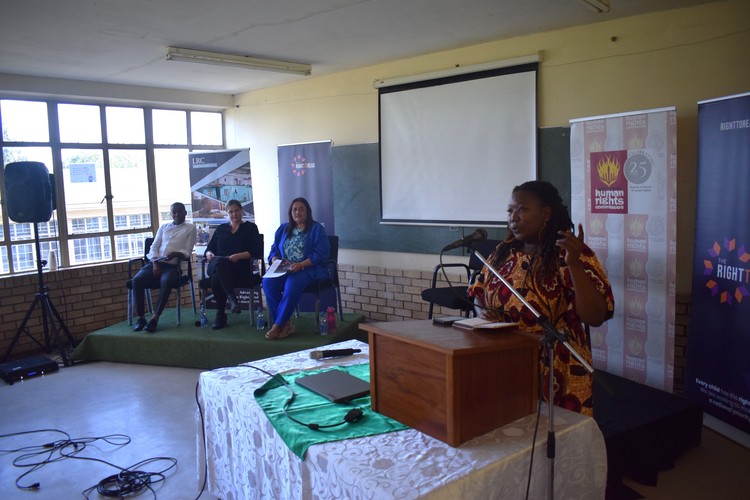
20 October 2023
George Dickerson Primary teacher Tabisa Booi spoke at the launch of the Right to Read Campaign in Makhanda, Eastern Cape, on Thursday. Photo: Lucas Nowicki
“Business as usual is not going to be good enough to change the future for our children,” said Sizwe Mabisela, Rhodes University Vice Chancellor, speaking at the launch of the Right to Read Campaign at Fikizolo Primary School in Makhanda, Eastern Cape, on Thursday.
The campaign brings together a coalition of human rights organisations to tackle South Africa’s escalating literacy crisis through legislative reform and advocacy.
While regulations are not “a silver bullet” they allow for more accountability and monitoring compared to the often vague guidelines published by the Department of Basic Education, said Cameron McConnachie, director of the Legal Resources Centre’s Makhanda office.
He said that the campaign will develop shadow regulations for reading through roundtables with people across the education sector, including government officials.
These regulations focus on creating binding requirements around the four Ts related to literacy: texts (reading materials), teaching (specialised literacy training), tests (regular assessments) and time (more time spent on reaching literacy).
Although there are guidelines for recommended reading, passed in 2008, there is still a severe shortage of appropriate reading material and resources for children.
Tabisa Booi, a teacher at George Dickerson Primary, said that while teaching Xhosa at a school outside King Williams Town, she found textbooks badly translated, taken straight from dense English stories “not at all related to students’ experiences”.
The campaign also seeks to make sure that teachers get specialised support and training to teach literacy.
Kelly Long, a researcher at NGO GADRA Education, said that although tests are important, they must not be implemented in a way that is “onerous” on teachers who are already battling to keep up.
The campaign is also calling for more time to be set aside to focus on literacy in the Foundation Phase curriculum.
The Right to Read Campaign – which was first launched in Constitutional Hill, Johannesburg on 30 August – comes in the wake of the Progress in International Reading Literacy Study released in May, which revealed that 81% of grade 4 learners in the country cannot read for meaning in any language, including their home language.
The campaign includes the Legal Resources Centre, South African Human Rights Commission, Equal Education, Centre for Child Law, SECTION27 and the Equal Education Law Centre.
For more information on the campaign visit the website.